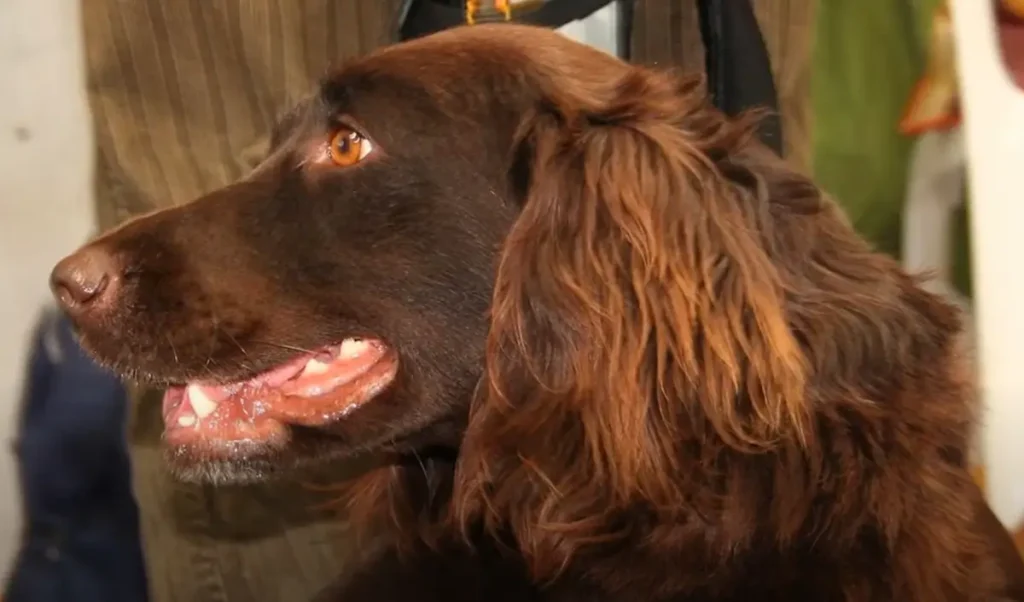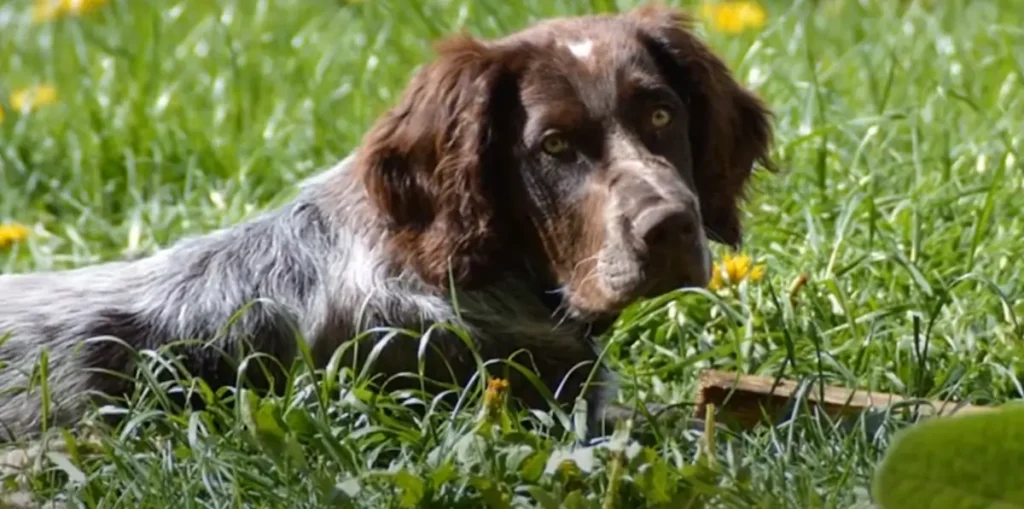You might think the Deutscher Wachtelhund is just another spaniel, but this German sporting breed stands apart with its unique skills and characteristics.
Known for their versatility in the field and adaptability to various hunting situations, these medium-sized dogs possess a keen sense of smell and an eagerness to retrieve that is matched by few.
They’re not merely hunting companions; their affectionate nature makes them excellent family pets, although they do crave attention and activity to prevent separation anxiety.
If considering the Deutscher Wachtelhund’s place in your home or out in the wilds, it’s crucial to understand their exercise needs, grooming requirements, and temperament.
Join us as we explore why this breed may be the perfect addition to your life, especially if you’re seeking a dog that seamlessly transitions from a rigorous day in the field to a cozy evening at your side.
Deutscher Wachtelhund: Traits, Temperament, and Care Guide
The Deutscher Wachtelhund is known for its medium stature and muscular frame. Its unique coat with distinctive feathering requires regular grooming to maintain its health and appearance.
This friendly dog is a versatile hunting companion, eager to please with positive reinforcement. They are eager to learn and respond well to training.
To keep them healthy, checking their ears regularly for signs of infection or irritation is essential. Cleaning their ears and keeping them dry can help prevent issues.
Weight management is also crucial for the Deutscher Wachtelhund. A balanced diet and regular exercise can help prevent weight gain and associated health issues.
Managing dental care is another crucial aspect of their overall health. Regular brushing and professional dental cleanings can help prevent periodontal disease and other oral health problems.
Additionally, it is essential to be mindful of separation anxiety in this breed. They are family-oriented and thrive on companionship, so providing them with plenty of social interaction and mental stimulation is essential for their well-being.
Exploring the Characteristics of the Deutscher Wachtelhund
Delving into the characteristics of the Deutscher Wachtelhund, you’ll discover a breed that’s not only athletic and robust but also exudes a dignified charm with its noble head and graceful neck.
| Aspect | Detail | Importance |
|---|---|---|
| Size & Build | Medium-sized, muscular | Ideal for sport |
| Coat & Care | Thick wavy hair, ears check | Prevents health issues |
| Temperament | Friendly personality | Suits active families |
| Hunting Ability | Excellent scenting abilities | Renowned hunting dog |
As sporting Spaniels, their versatility and adaptability shine, connecting you to a community of like-minded enthusiasts.
Deutscher Wachtelhund: A Comprehensive Profile and Guide
You’re about to get an in-depth look at the Deutscher Wachtelhund, a breed with a rich heritage and dynamic role in sporting.
They’re not just skilled hunters; their affectionate nature makes them ideal companions for active families.
We’ll cover everything from their physical traits to their exercise needs, ensuring you understand what it takes to provide this unique dog with a happy, healthy home.
Everything You Need to Know
Embarking on a journey with a Deutscher Wachtelhund means welcoming a multifaceted companion, boasting a rich lineage as a German hunting dog and an unwavering loyalty that endears them to families and sportsmen alike.
- Breed Traits:
- Versatile hunting breed, skilled scent follower
- Thick wavy hair, aligning with breed standard
- Family friendly, bonds deeply with owners
- Health Watch:
- Prone to hip dysplasia; regular veterinary checks recommended
- Vigilance for other health problems ensures a robust life
- Heritage:
- Descended from the Stober, an esteemed German hunters’ companion
- Maintains the tradition of excellence in fieldwork
Discovering the Temperament
Understanding the temperament of the Deutscher Wachtelhund is crucial if you’re considering this breed as a new family member. They’re known for their adaptable, friendly nature and form strong bonds with their owners. These natural hunters are affectionate and friendly, making them great family dogs, especially around children who learn early how to interact.
They get along well with other pups but may develop separation anxiety if left alone.

Deutscher Wachtelhund: Is It a Good Fit for Families?
If you’re considering a Deutscher Wachtelhund for your household, you’ll find they’re generally great with families, thanks to their friendly and affectionate nature. These dogs are especially well-suited for active families who can match their high energy levels and need for regular exercise.
However, due to their strength and exuberance, they’re often better companions for older children who understand how to interact with dogs responsibly.
Assessing Deutscher Wachtelhund’s Compatibility with Families and Kids
When evaluating whether the Deutscher Wachtelhund is the right pet for your household, consider its friendly and adaptable nature that often makes it a loyal addition to family life.
- Compatibility with Families
- Thrives in various family settings
- Enjoys play, especially with older kids
- Adapts well with other pups
Ensure your approach includes plenty of activity to keep your German Wachtelhund happy and healthy.
Versatile Hunting Companion Adaptability
The Deutscher Wachtelhund is a highly adaptable breed. It excels as a versatile hunting companion, whether in an apartment or the expansive countryside.
With abilities similar to other German hunting breeds, Deutscher Wachtelhunds are cherished by hunters for their adeptness in tracking various types of game.
They thrive when their innate talents are nurtured through performance tests, ensuring each Wachtelhund’s hunting prowess is honed to perfection.
Obedience Training for Wachtelhunds
When you start obedience training with your Wachtelhund, you’ll find their adaptability and quick learning abilities to be a significant advantage.
It would be best to use positive reinforcement methods like treats and praise to encourage good behavior, as Wachtelhunds respond well to these methods.
Effective Training Strategies
To lay the groundwork for a well-mannered Deutscher Wachtelhund, start obedience training early, using positive reinforcement to foster a strong, obedient character.
| Strategy | Benefit | Tips |
|---|---|---|
| Positive Reinforcement | Enhances learning | Use treats and praise |
| Socialization | Prevents behavior issues | Introduce new experiences |
| Consistency | Ensures clarity | Same commands, same rewards |
| Varied Sessions | Keeps training engaging | Change exercises regularly |
| Patience | Builds trust | Stay calm and patient |
Deutscher Wachtelhund Exercise and Grooming Needs
Understanding a Deutscher Wachtelhund’s need for vigorous exercise and meticulous grooming is essential. These spirited dogs thrive on daily physical activity and regular coat care. Maintain their thick, wavy Wachtelhund coat with a metal comb and brush at least once a week. Trim your dog’s nails and brush their teeth daily to ensure overall health. A fenced yard keeps them at a healthy weight, with regular veterinary check-ups supporting their wellbeing.

Health Considerations
As you consider bringing a Deutscher Wachtelhund into your life, you must be aware of their potential health issues and general lifespan.
These dogs may face hip dysplasia and skin allergies, so you must schedule regular vet visits for a thorough health check.
Additionally, stay vigilant for signs that may warrant specific tests, such as X-rays for their hips or allergy assessments to keep your companion in top shape.
Common Health Issues and Lifespan
The Deutscher Wachtelhund is a robust medium-sized sporting dog. It typically enjoys a lifespan of 12 to 14 years. However, like many breeds, it is prone to certain health issues. Some of these health issues include hip dysplasia and skin allergies. To ensure that your best dog remains generally healthy, it is important to adopt a routine of regular check-ups. Additionally, caring for it with grooming at least once a week can help prevent conditions that commonly affect breed dogs.
Deutscher Wachtelhund: A Hunter’s Best Friend in the Field
The Deutscher Wachtelhund, akin to other German hunting dogs, is a relentless tracker and a versatile hunting companion.
| Similar Dogs | Short Description |
|---|---|
| German Shorthaired Pointer | A versatile hunter known for its athleticism and keen sense of smell. |
| Bavarian Mountain Scent Hound | A breed known for its tracking ability, especially in mountainous terrain. |
| Bloodhound | Famous for its unparalleled scenting ability, used in tracking and law enforcement. |
| English Springer Spaniel | An enthusiastic hunting partner, known for its stamina and agility. |
| Weimaraner | A breed known |
Is Deutscher Wachtelhund the Right Pet for You?
Considering a Deutscher Wachtelhund as your next canine companion requires evaluating whether their high energy and exercise needs align with your lifestyle. This breed, recognized by the United Kennel Club and the Verein fur Deutscher Wachtelhund, traditionally owned by professional hunters and foresters, thrives with owners who can dedicate ample time at home.
Their thick and somewhat harsh coat, often brown schimmel, suits the outdoors, but may overwhelm smaller pets.
Conclusion
In the dance of dog breeds, the Deutscher Wachtelhund twirls with grace, its athletic frame and robust spirit a symphony of natural hunting prowess.
As a family companion, it’s a heartwarming duet of loyalty and love, though it plays a solo tune when left alone.
Nurturing this breed requires a maestro’s touch in training and care, ensuring a harmonious life.
If you’re seeking a four-legged virtuoso of the fields, the Wachtelhund may just be your perfect pet concerto.
Frequently Asked Questions
Are Deutscher Wachtelhunds Hypoallergenic?
No, Deutscher Wachtelhunds aren’t hypoallergenic. Their shedding and pet dander may trigger allergic reactions. However, proper grooming, including regular brushing and air purification in your home, can help with allergy management.
Where Did the Deutscher Wachtelhund Come From?
You’re delving into the Deutscher Wachtelhund’s German origins, a breed steeped in hunting lineage. With Stöberhund ancestry, these forestry companions excel as game retrievers and versatile hunters, cherished within regional kennel clubs for breeding evolution.
What Type of Dog Is a Guide Dog?
A guide dog undergoes rigorous training to meet behavioral standards for service animal roles, providing vision assistance and mobility support. Breed suitability is crucial, ensuring they’re reliable companions that enhance accessibility and public understanding.
What German Dog Looks Like a Springer Spaniel?
If you’re looking for a German dog that resembles a Springer Spaniel, you’re barking up the wrong tree. Consider the Deutscher Wachtelhund’s Springer similarities, loyal temperament, and storied history as hunters’ faithful companions.
